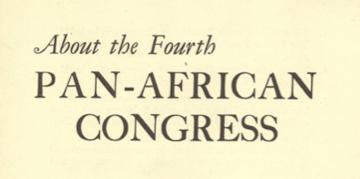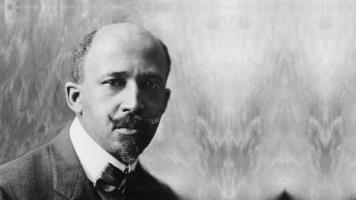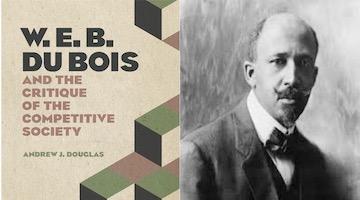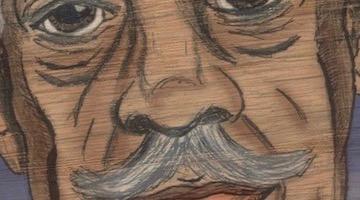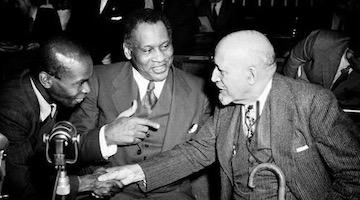W.E.B. Du Bois and the Paths to Communism: A Review
Du Bois, the father of Pan Africanism and the towering theorist of race, was – just as importantly -- one of the great theorists of communism.
“Du Bois viewed the Russian revolution as the beginning of reclaiming the civilizations of the East as part of a march to communism.”
In 1950 W.E.B Du Bois completes a manuscript, Russia and America, which seventy years later remains unpublished. It is a revolutionary book. It is a defense of socialism in the Soviet Union, a theorization of the possibilities of socialism becoming a world system, replacing world capitalism, and socialist globalization coming through Asia and how the probable path to communism would witness an Asian leap through the centuries. However, the transitions from socio-economic backwardness to socialism and finally communism would require social scientific knowledge and sophisticated planning. All of this would bring forth a new epoch, a new world socio-economic system and new human civilizations.
The prerequisites for communism were, he theorized, more readily grounded in the values of ancient Asian civilizations, especially ones that had had socialist revolutions and established the democratic dictatorship of the proletariat. Du Bois thought creatively about questions such as forms of state power, including the dictatorship of the proletariat and the state of the entire people, which evolves from it, and what is today called the civilization state. He thought in new, unprecedented ways, about a new type of communism, (“a different kind of communism”) based on a new way of thinking, and forms of state power and people’s democracy rooted in Asian civilizational values. He creatively synthesized several modalities of social scientific, philosophical and historical investigation; comparing civilizations and their possibilities to achieve communism. These interrogations have meaning in the 21st century; a century where Asia will overtake the West and the US is confronted with domestic political instability and a rising crisis of government and bourgeois class rule. The manuscript is framed by Du Bois’ characteristic optimism, in spite of the Cold War, and domestic police state repression; and even as he was being indicted as an agent of a foreign nation.
“Du Bois thought creatively about questions such as forms of state power, including the dictatorship of the proletariat and the state of the entire people.”
In 1961 before leaving for Ghana to restart work on his Encyclopedia of Africa and to live his final days, he joined the Communist Party of the United States, declaring, “I believe in communism.” The father of Pan Africanism, the towering theorist of race, a vanguard in the anticolonial struggle, was, as importantly, one of the great theorists of communism. For the final forty years of his life he theorized and rethought possible paths to socialism and communism. After a month in the Soviet Union in 1926 he wrote “If what I’ve seen is Bolshevism, I am a Bolshevik.” After being arrested for his peace activism he rebuked the US government declaring “Blessed are the peace makers for they shall be called communist, is that praise for the communist or condemnation for the peace makers.” In substantial ways the manuscript is a theoretical outline of his rearticulation of socialism and communism, civilization, the state and the class struggle.
Du Bois insisted that thinkers and politicians who traded in anti-Sovietism and anti-communism were the worst enemies of progress and of humanity. In the manuscript he defends the leaders of the Russia Revolution, especially Lenin and Stalin. He says the critical question for the Russian Revolution was: “Can you make the worker and not the millionaire the center of modern power and culture?” And again, “Can Russia continue to think of the State in terms of the worker?” However, Du Bois looked at the Soviet Union and the Russian Revolution through the lenses of what he called “the unity of Pan Africa and Pan Asia”; what I call intercivilizational unity. He saw the Russian Revolution in civilizational terms and as essentially Asian. He viewed it as the beginning of reclaiming the civilizations of the East as part of a march to communism; while the West on its own could only manage New Deal type social democracy. Hence, for the progressives and radicals in western nations their ultimate contribution to the forward march of human civilization was to fight for peace and against imperialist wars. The fight for peace is a form of mutuality and internationalism. Africa and Asia’s advances to socialism and communism, would create global circumstances for the working classes in the West to be pulled along by winds of revolutionary change coming from the East. The advances of the East create favorable conditions for revolutionary change in advanced capitalist nations. Moreover, rather than undermining of better wages, living conditions and jobs for workers in capitalist nations, (all of which experience very slow to no growth and permanent unemployment and poverty for about half the work force), Asia and Africa’s advances to socialism and communism grows the global economy and widens opportunities for all workers globally.
“If what I’ve seen is Bolshevism, I am a Bolshevik.”
The towering accomplishment of the manuscript is Du Bois’ theorizing of the relationships between civilization, class struggle, socialism and communism and the multiple questions surrounding these issues. The Russian Revolution became for Du Bois a concrete area of research in history and sociology. It was part of his search for the truth that might make the future predictable. He studied the dictatorship of the proletariat as a form of people’s democracy and people’s defense of their revolutionary triumphs. He studied its main leaders as an examination of what revolutionary leadership looked like. He examined the careers and moral character of Lenin, Stalin and Trotsky. Lenin, “one of the great men of this century” was, he said, a social scientist. “Lenin was not the sort of modern Sociologist, who boasted of his science, and did nothing to discover its laws.” Du Bois concludes “following Karl Marx, he saw the rhythm of history and determined to plan human life in accord with known knowledge” And therefore, “He studied not only the written word of history and economics, but the actual current deeds of living men.” Stalin was from the East, Du Bois tells us. He was, “inconspicuous, cautious and taciturn.” He became a socialist while organizing among oil workers. “He followed the plans of Lenin.” “He sought methods of action to implement revolution.” Trotsky was a dreamer, a brilliant orator and inspirer, but in the end, as Du Bois insists betrayed Russia and the revolution to Germany.
He saw China, like the Soviet Union, as the nation where the same questions could be studied. Ruined by civil war, feudal relationships of production and foreign control, China, for him, remained indispensable to understanding the possibilities of communism. “Any attempt to explain the world, without giving China a place of extraordinary prominence is futile.” Speaking of a new socialist economic system in China after the Chinese Revolution, Du Bois says, “It would take a new way of thinking on Asiatic lines to work this out, but there would be a chance that out of India, out of Buddhism and Shintoism, out of age old virtues of Japan and China itself, to provide for this different kind of communism, a thing which so far all attempts at a socialistic state in Europe have failed to produce; that is a communism with its Asiatic stress on character, on goodness, on spirit, through family loyalty and affection might ward off Thermidor (counterrevolution -- AM); might stop the tendency of the Western socialistic state to freeze into bureaucracy.” He concludes, “It might through the philosophy of Gandhi and Tagore, of Japan and China really create a vast democracy into which the ruling dictatorship of the proletariat would fuse deliquesce: and thus instead of socialism ever becoming a stark negation of freedom of thought and a tyranny of action and propaganda of science and art, it would expand to a great democracy of the spirit.” Critical to all of this is breaking the over-determination of capitalist laws of development over human social relations; they would be replaced with the laws of socialist development leading to communism and freedom. This, in Du Bois’ thinking, is the movement from Necessity to Freedom; from over-determination by the laws of capitalist development to full human actualization and the new human being. The great tragedy, however, for an emerging Pan Asian civilizational convergence, was that Japan “learned Western ways too soon and too well and turned from Asia to Europe.”
“Any attempt to explain the world, without giving China a place of extraordinary prominence is futile.”
Russia and America is part of Du Bois’ most significant, innovative and creative period; it’s part of his magisterial research agenda, at its most mature, and a creative synthesis of multiple areas of knowledge. It’s the last 40 years of his life. He produced works that are a foundation for revolutionary thinking and practice in the 21st century. He produces some of the most important work in US and modern intellectual history. These works, Black Reconstruction in America, Dusk of Dawn: An Essay toward An Autobiography of a Race Concept, Color and Democracy, The World and Africa, In Battle for Peace and Russia and America can be viewed as a single whole, with an integrity and commonality, and a single-minded commitment to revolutionary change. They evidence a revolutionary historiography, epistemological and philosophical ruptures and relocations and a radical and creative sociology. These are foundational revolutionary works. He called Karl Marx the most important modern philosopher. He made no bones that much of his research took into account Marx’s scientific discoveries. Du Bois, thus, creatively synthesizes Marxism, scientific socialism and investigations of civilizations. He’s always looking for empirical facts to support his conclusions; his experimental methodological apparatuses are his way of getting to difficult to discover truths, and he deploys logics in unusual ways, seeking laws of social development and what he calls “uncaused causes.” He bends and revises Marxian assumptions geared exclusively to Europe; and explains how race, class and civilizational questions must be addressed if we are to understand the forward trajectory of history to socialism and communism.
As though to confirm Du Bois’ ideas from the middle of the 20th century, President Xi Jinping of China gives two important 21st century speeches: “Commemoration of the 200th Anniversary of Karl Marx’s Birth” and “Speech at the Opening Ceremony of the Conference on ‘Dialogue of Asians Civilizations.’” On Karl Marx’ approach to science Xi quote Fredrich Engels, “Marx’s whole way of thinking is not so much a doctrine as a method. It provides not so much ready-made dogmas, as aids to further investigation and the method for such investigation.” Engels also noted that theories “[are] a historical product, which at different times assumes very different forms and, therewith, very different contents.” Xi goes on to say, “The basic principles of scientific socialism cannot be discarded; once discarded it would cease to be socialism.” And on civilization, Xi argues,” To meet our common challenges and create a better future for all, we look to culture and civilization to play their role, which is as important as the role played by economy, science and technology.” President Xi’s thinking confirms and is commensurate with Du Bois’ thought.
“Marx’s whole way of thinking is not so much a doctrine as a method.”
However, in 1991 as the Soviet Union was brought down by an internal counter revolution, assisted by the West, and as the world communist movement unraveled, the conservative philosopher Francis Fukuyama declared the end of history. He declared , “What we may be witnessing is not just the end of the Cold War, or the passing of a particular period of postwar history, but the end of history as such: that is, the end point of mankind's ideological evolution and the universalization of Western liberal democracy as the final form of human government.” Bourgeois liberalism, imperial empires and the laws of capitalist development would now go unchallenged; the class struggle would end, and the ideological struggle would conclude with the triumph of the West. The old normal before the Russian and Chinese Revolutions and the anti-colonial struggles would return. He could not have been more wrong as shown by the world we now inhabit.
What Fukuyama called the end of history, Du Bois earlier called a “descent into Hell”. On the other hand, the Russian Revolution, the rise of Asia and Africa, and new creative modes of transition to communism is the start of actual human history; history when human freedom genuinely starts; the start of new history, history which, in Du Boisan conceptualizations, leads to genuine human freedom and communism.
Anthony Monteiro is an organizer with Philadelphia’s Saturday Free School, a Du Bois scholar, a community educator, a radical and activist.
COMMENTS?
Please join the conversation on Black Agenda Report's Facebook page at http://facebook.com/blackagendareport
Or, you can comment by emailing us at comments@blackagendareport.com

